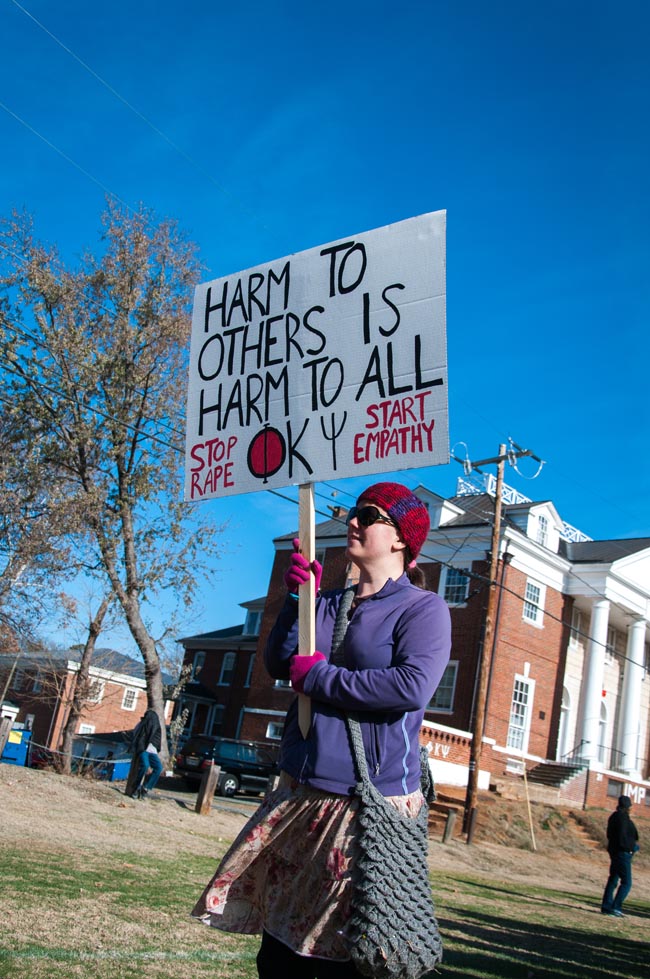Published in November of last year, Rolling Stone’s story “A Rape on Campus” exploded on social media, attracting more than 2.7 million views. Written by Sabrina Rubin Erdely, the article recounted the alleged gang rape of source “Jackie” by fraternity members at a chapter house party. The article also implied that the assault was part of an initiation ritual. Facebook news feeds were dominated by links to the article, Twitter hashtags expressed support for Jackie and online media outlets commenced a steady stream of commentary. All shared a common sentiment of outrage and disbelief at the brutality of the alleged crime, along with a passionate desire to see immediate, meaningful change: in Greek life, in the University of Virginia’s administration and in our culture as a whole.
Over time, however, skepticism about the story grew: Questions about Erdely’s sources and contradicting details about the night of alleged attack surfaced. Jackie’s story as reported in the article fell apart, and by late March, Charlottesville police closed their investigation of the assault with the conclusion that there was “no substantive bases to support the account alleged in the Rolling Stone article.”
This past Sunday, the story that sparked a massive conversation about sexual assault and rape culture was formally retracted and apologized for by both its writer and its publishing magazine. A report by the Dean of the Columbia School of Journalism Steve Coll found that the failures behind the article were based in methodology, “compounded by an environment where several journalists with decades of collective experience failed to surface and debate problems about their reporting or to heed the questions they did receive from a fact-checking colleague.”
Additionally, the report cites confirmation bias as a factor in the Erdely’s errors: she “believed the university was obstructing justice…Jackie’s experience seemed to confirm [a] larger pattern.” But this combination of confirmation bias and lack of critical examination is not a mistake resting solely on the shoulders of Erdely and her editors; we, their readers, are equally guilty.
As doubts about the article’s validity grew, so did accusations of callousness and sexism towards its critics. Hashtags such as #IStandWithJackie and #IBelieveJackie stressed the importance of the account relayed in the article to the issue of sexual assault in general. Erdely deflected questions about her investigation of Jackie’s story, stating that “dwelling on [the questions], you’re getting sidetracked,” and the real story wasn’t Jackie’s account, but “the culture that greeted her and so many other U. Va. women I interviewed…”
Because the issue “A Rape on Campus” addressed was so socially relevant, the article itself was protected from scrutiny. It’s significance to readers made it untouchable, immune to disbelief. To question its accuracy was to challenge the political cause it represented. Consequently, those whose pre-existing views were supported by the article accepted and invested in it, while those who questioned its validity were framed as doubting sexual assault claims as a rule.
If we want to make a difference, if we want to examine and address important issues seriously, we need to do the same with ourselves. In this age of expanding Internet media, it is easier than ever to tailor our news consumption to fit our worldview. One need only type in a phrase expressing an opinion they share and be instantly presented with a vast array of pieces agreeing with them. The easier it is to fall into this trap, the more responsible we are for reading with a critical eye and seeking out a broader spectrum of perspectives.
If we fail to do this, we not only fail to challenge ourselves — we fail to challenge news organizations to report fairly and accurately. We allow more articles like “A Rape on Campus” to fall through the cracks. And, ultimately, we undermine the causes we seek to advance. Journalism is a two-way street, and we all lose when we fail to do our part as thorough reporters and critical consumers.
Email Isabel Larroca at imlarroca@email.wm.edu.


Well said. The truth matters. All too often events, or non events, are spun to fit one’s view of things. When they blow up as in this case, and the lacrosse mess at Duke; it offers a ‘wake up moment’.